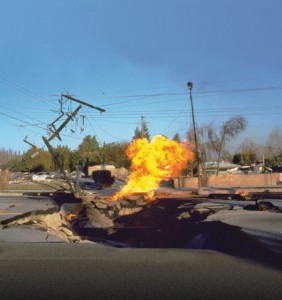High pressure lines are closely monitored by a number of agencies. Your local utility or city will be the most familiar with the state of high pressure lines in your area, and with the monitoring guidelines and records.

Gas fire erupting through LA street after Northridge earthquake. (photo by M. Rymer)
No matter how carefully lines are monitored, however, leaks and breaks can happen. Most often, they happen when construction equipment accidentally punctures a line. They can result from a natural event like a storm, earthquake, tornado, or ice storm. Sometimes an over-loaded, aged infrastructure is to blame.
Leaks could happen at any time.
How do your local gas lines stack up?
An online search using the National Pipeline Mapping system is a good place to start. Dig deep on that site to find the names of the various operators of the different lines in your area. Contact them to get more details about the age and condition of their lines, their monitoring and safety policies and plans, etc.
If you think you have an emergency…
If you see or hear any of these near a pipeline right-of-way, it could signal a leak:
- A hissing, roaring sound
- Dirt or dust blowing
- Water bubbling or spraying
- Dead or brown vegetation
- Flames coming from the ground
- “Rotten egg” smell
(Typically the “rotten egg” smell is added only to smaller distribution lines. It won’t appear in major transmission lines.)
What’s the right response to a potential gas leak?
Get out! But do it intelligently.
- Turn off any machinery or motors.
- Don’t turn on or use any electrical equipment that could create a spark. This includes turning lights on or off, making a cell phone call, closing a garage door, or using a battery-operated radio!
- Do not allow any open flames, including matches, cigarette lighters, welding equipment, etc.
- Evacuate the immediate area. If exiting a building, leave the doors open.
- Keep bystanders away.
- Do not try to find the source of the leak.
- Do not operate any valves or other shut-offs.
- Do not attempt any repairs.
- Do not attempt to put out any fires.
- From a safe distance, call 911.
Emergency Preparedness Training
Action Items: Train your Emergency Response Team to recognize this hazard and to respond accordingly. Invite an expert as guest speaker to one of your neighborhood meetings. Prepare a flyer (taken from this Advisory?) and include it in your “Welcome Wagon” handouts for new neighbors.
We consider gas line leaks and the potential for fire resulting from them as the number one threat to our neighborhood! Where do they fit in your list of top threats?
Don't miss a single Advisory.
Thank you for subscribing.
Something went wrong.
